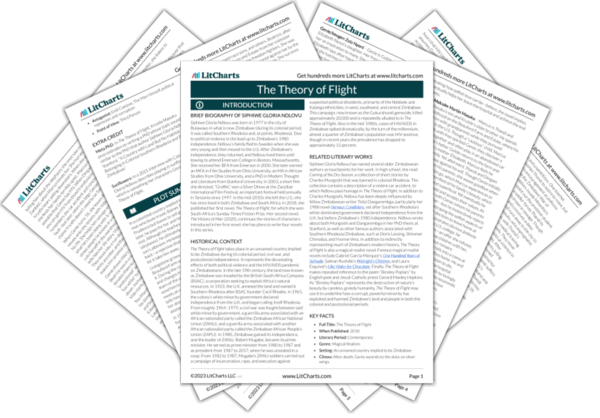It’s a common trope that love, especially family love, is selfless, the paradigmatic example being a mother’s selfless love for her baby. Contradicting that trope, The Theory of Flight suggests that love is often selfish and that learning to love others selflessly takes effort. The novel’s central example of selfish love is the Masukus, who adopt the main character Genie when her parents disappear after a massacre at the farm compound where they live, the Beauford Farm and Estate. The Masukus all love Genie in egocentric ways. The father, Dingani, wants young Genie to “belong to him” to assuage his guilt at having accidentally caused the Beauford Farm massacre. It’s strongly implied that the mother, Thandi, wants to adopt Genie to prevent her adoption by Genie’s aunt Minenhle, whom Thandi loathes. The daughter, Krystle, only warms up to adopting Genie when she decides Genie isn’t as pretty as she is and so can’t outshine her. The son, Marcus, loves Genie romantically and possessively—but cruelly and instinctively rejects her when he learns she has HIV, indicating that in weak moments, fear and self-preservation trumps his love. When Genie decides to die after long struggles with HIV/AIDS and cancer, the Masukus selfishly want to force her to return to a hospital. Yet as they search for Genie, most of them slowly come to terms with how badly they have treated her: Krystle admits to herself that they loved Genie “jealously . . . possessively . . . imperfectly,” Dingani confesses to his role in the Beauford Farm massacre, and Marcus realizes he has to let Genie go and be present to his wife Esme. At the novel’s end, after many struggles and mistakes, the Masukus come together in a less selfish way to mourn Genie and support one another. Thus the novel suggests that selfishness is often a default position when it comes to love, and people have to fight hard to treat the people they love unselfishly.
Love, Family, and Selfishness ThemeTracker

Love, Family, and Selfishness Quotes in The Theory of Flight
“Do I have a father?”
“It depends.”
“On what?”
“On the future.”
“We are your family now,” his new grandmother said, still not smiling. They all looked beautiful, the members of his family, but Marcus felt that their beauty was not to be trusted. It was a dangerous beauty. He was suddenly more terrified than he had ever been before. He let go of his bladder then, well aware that his urine would soil both his shorts and his mother’s shiny dress.
Bhekithemba did not believe in love, at least not in romantic love. He understood the love one had for one’s parents and one’s country—but that sort of love was born of respect and gratitude. It was a sort of giving back. There was a reason for that kind of love. It was only natural to love the things that had given you life, a sense of place, a feeling of belonging, a connection to things beyond yourself. You could not exist without those things and so of course you loved them. It was a selfish love: a love of self-preservation. Selfish love was understandable . . . reasonable. But romantic love had no reason.
The burning of that photograph was the only thing she did after the death of her beautiful, golden-haired boy that did not feel like a betrayal.
He heard his father’s voice say: “There are many ways to be a man. Always remember that.” He knew that in uttering these words his father had prepared him for precisely a moment such as this. His father had spoken the words at a time when Vida had needed absolute understanding and acceptance. And this was a time in Genie’s life when she needed absolute understanding and acceptance.
“Promise me you will never speak to me of love,” she said. She looked at him and ran the back of her hand idly over his chest. “To not have to speak of love is such a freeing thing.”
Funny that during her final moments her thoughts and concerns should be so domestic.
After a lifetime of believing she was in flight, of believing that she was something spectacular in the sky, had she rather been a hybrid thing—something rooted but free to fly? Could such a hybrid thing even exist?
Krystle looks at the telltale line left behind by the adhesive tape. She gets down on her knees and traces the grimy demarcation with her index finger. Tracing the evidence that Genie’s life with them had not been as easy as they all liked to remember. They had loved her in their own way, the only way they knew how . . . jealously . . . possessively . . . imperfectly.
Genie chooses this particular moment, with the survivors as her witnesses, to fly away on a giant pair of silver wings . . . and leave her heart behind to calcify into the most precious and beautiful something that the world has ever seen.
As the survivors watch her ascend she experiences love as the release of a promise long held.
This is where he belongs.











